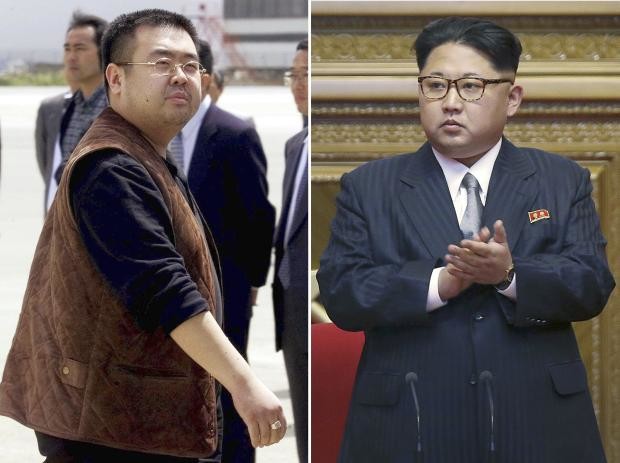
This combination of file photos shows Kim Jong Nam (left) exiled half brother of North Korea’s leader Kim Jong Un, in Narita, Japan, on May 4, 2001, and North Korean leader Kim Jong Un on May 9, 2016, in Pyongyang, North Korea. Kim Jong Nam, 46, was targeted Monday, Feb. 13, 2017, in the Kuala Lumpur International Airport, Malaysia, and later died on the way to the hospital according to a Malaysian government official. (Photos by SHIZUO KAMBAYASHI and WONG MAYE-E/AP)
SEOUL—It looks like a perfectly staged assassination, straight out of the pages of a spy novel: North Korean royalty Kim Jong-nam, the estranged, exiled half-brother of leader Kim Jong-un, falls ill at a Malaysian airport, complains of being sprayed with some sort of chemical, and drops dead.
But, as with many things about the alleged motives of cloistered North Korea, the unknowns currently far outweigh the certainties.
Kim falls ill
Kim Jong-nam, 46, was assassinated at the airport in Kuala Lumpur on Monday, telling medical workers before he died that he had been attacked with a chemical spray, a Malaysian official said on Tuesday.
Kim had not gone through immigration yet for his flight to Macau when he felt ill and asked for help, according to a senior government official, who spoke on Tuesday on condition of anonymity because the case involved sensitive diplomacy.
Kim was taken to the airport clinic and then died on the way to the hospital, the official said.
Multiple South Korean reports, citing unidentified sources, said Kim was killed at the airport by two women believed to be North Korean agents. They reportedly fled in a taxi and were being sought by Malaysian police.
Here’s a look at what officials are trying to piece together as they work to reconstruct one of the most audacious, mysterious assassinations in recent Asian history.
Why now?
This is the big one: motive.
Kim Jong-nam, a jovial, overweight gambler and playboy, had embarrassed Pyongyang before—he tried to sneak into Tokyo Disneyland; he criticized his half-brother—but he’s been generally seen more as an annoyance than an existential threat to North Korea’s stability.
Why would Kim Jong-un go through the massive logistical trouble—and potential embarrassment—of staging the risky assassination of a blood relation on foreign soil?
Without elaborating, South Korea’s spy service told lawmakers on Wednesday that the North had been trying to kill Kim Jong-nam for five years.
Spy officials offered a single, shaky motive for the death: Kim Jong-un’s “paranoia” over his estranged brother.
But the South’s National Intelligence Service has a long history of botching intelligence on North Korea and has long sought to portray the North’s leadership as mentally unstable.
Some in Seoul wonder if Kim Jong-un might have become enraged when a South Korean newspaper reported last week that Kim Jong-nam tried to defect to the South in 2012.
South Korea’s spy service denied this, but it’s still an open question: Could public speculation that a member of the exalted Kim dynasty wanted to flee to the hated South have pushed Kim Jong-un to order his brother’s assassination?
Why at Malaysia airport?
There would seem to be easier, less public places to kill such a high-profile target.
A possible explanation might be found in another nugget provided by South Korea’s spy agency: China had long protected Kim Jong-nam and his family at their home base in Macau.
Analysts have seen Beijing as looking to Kim Jong-nam as a potential leader should North Korea’s regime collapse.
With security, presumably overseen by China, tight in Macau, could there have been a security gap in Malaysia that offered North Korean assassins an opportunity they couldn’t have gotten elsewhere?
Who are mystery women?
The details of the attack itself are a tangled mess as of now.
Kim told medical workers that he had been sprayed with a chemical, which brings to mind past attacks with poison-tipped pens linked to North Korean assassins.
South Korea’s spy agency said two women believed to be North Korean agents attacked Kim. They then reportedly fled.
Japanese media quoted the government in Tokyo as saying those women may now be dead.
None of this has been confirmed yet.
Still, finding out who these women are and who hired them could go a long way to unlocking the mystery.
What next?
North Korea has said nothing officially about the death, but that’s not unusual.
The country’s propaganda specialists are masters at reporting only details that lionize the Kim family as paragons of virtue. This clearly doesn’t do that.
China may be angry at the killing of a close North Korean contact, so there could be some sort of reaction, possibly back-channel, from Beijing.
But a more concrete punishment could come from Washington.
Cheong Seong-chang, a South Korean analyst, said the assassination might convince US Congress to relist North Korea as a state sponsor of terrorism, further isolating the already widely shunned country.